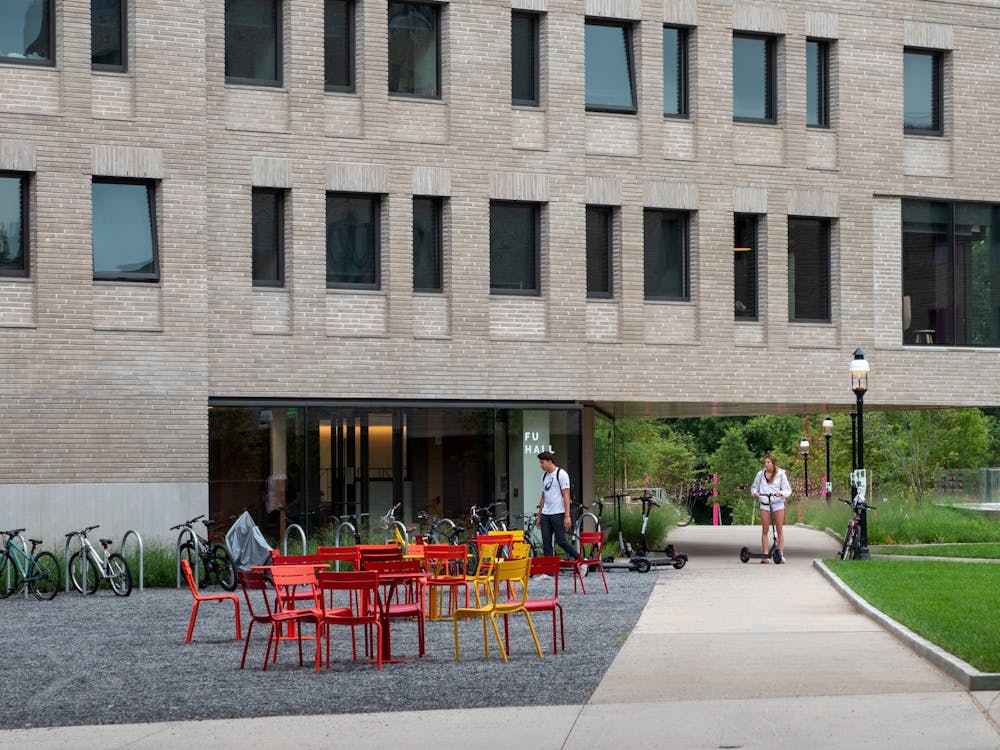Earlier this semester, Princeton students walked to class under the heavy haze of wildfire smoke.
I found wildfire smog hanging in the air, smelled it as seeped through my dorm's window, sneezed as it aggravated my allergies, and watched as it cast a haze over the sun. As of today, thousands of acres of our state have burned, dozens of structures found themselves under threat, and the state has experienced little meaningful rainfall in months.
The scent of wildfire smoke on campus serves as a timely warning that Princeton is far from immune to the threats presented by the climate crisis. Too often, Princeton pretends that climate change is a purely global problem, rather than a pressingly local one. But in the wake of these dire warnings, it is time for the University to remember that the climate crisis will one day affect Princeton’s campus even more directly — and to redouble its commitments to leadership on climate, sustainability, and environmental justice.
In order to do that, we must first confront the evidence at hand: this year, wildfires raged in New Jersey for the first time in decades — a product of an “unprecedented” and “remarkable” drought, according to the state’s climatologist. Over 500 wildfires have started in New Jersey since the beginning of October, and the entire state remains in a severe drought worsened by climate change.
And yet we still dismiss wildfires as a “California problem.” While 78 percent of Californians worry about the threat of wildfires, just 31 percent of Northeasterners consider them to be a serious problem. But as the climate crisis worsens, more Americans will be forced to confront the threat of wildfires tearing through their hometowns.
Even so, a sense of invulnerability pervades Princeton. Even with the fires so close to home — and the inescapable scent of climate disaster recently reaching our campus — the University has failed to act with urgency, instead reversing real progress and setting us further back. Princeton students, who regularly have lower turnout for protests than students at peer institutions, also show up less for climate protests: only about 60 students protested Princeton’s dissociation reversal in October, while peer institutions like Brown, Dartmouth, Harvard, and Yale often see higher turnout for climate-related demonstrations.
But while the fires today are about thirty miles away from our campus, Princeton will not be impervious to climate disaster forever. According to the U.S. Climate Vulnerability Index, a collaboration between the Environmental Defense Fund and Texas A&M University, the census tract containing most of Princeton’s campus is in the 90th percentile amongst all U.S. tracts for future risk of climate disasters. We are in the 94th percentile for storms, the 87th for flooding, the 70th for precipitation, the 69th for drought, and, yes, the 81st percentile for the annual frequency of wildfires. More than one third of properties in municipal Princeton are threatened by wildfires.
This reality of climate catastrophe is not confined to some far-off future. It is very nearly here. The Climate Vulnerability Index is a projection for 2050, if we fail to change course. Professors who are beginning their careers here today will probably still be teaching here when the banks of Lake Carnegie overflow; administrators who roll back University climate policies today could very well still be in power twenty or twenty-five years from now when wildfires burn on the doorstep of Yeh College; today’s students and young alumni will be serving on the Board of Trustees when our bonfire tradition is deemed too risky because of drought and permanently prohibited.
The administration recognizes that climate change is a global problem: University President Christopher Eisgruber ’83 wrote in 2022 that “climate change poses a daunting and unprecedented challenge to humanity.”
Today, we face an inflection point: Princeton must stand up not only for the world but also for itself. It must move toward complete dissociation so that its brand name no longer rubber-stamps pro-fossil fuel research that allows companies like BP and ExxonMobil to continue fueling the crisis. To compensate, it must aggressively pour funding into climate change research free from the influence of fossil fuel companies (as it did with the Energy Research Fund).
The University must also divest the $700 million it still has invested in privately held fossil fuel companies, as Sunrise Princeton has reported, and invest that money into renewable energy companies instead. And it must heed my colleague Alex Norbrook’s call for sustainable “construction everywhere, all at once” to move our campus aggressively toward net zero emissions as soon as possible.
Princeton students must push our university to do better — and if you care about our collective future, you can act. Join Sunrise Princeton. Attend a climate rally or teach-in. Write emails to University officials. Talk to your friends and get them to care, too. Mobilize and organize in every way you can to push Princeton toward a better, brighter, greener future.

If Princeton acts in this manner, perhaps other universities — and the world — will begin to follow suit. But that is not the point. As a University, we must act today with ambition and with resolve. These measures would finally bring Princeton into the twenty-first century on climate change. If we fail, Princeton may not see the twenty-second.
Isaac Barsoum is a first-year contributing opinion writer from Charlotte, N.C. intending to major in Politics. He believes that loving Princeton means finding ways it can become a safer, happier, more inclusive place. You can reach him at itbarsoum[at]princeton.edu.








